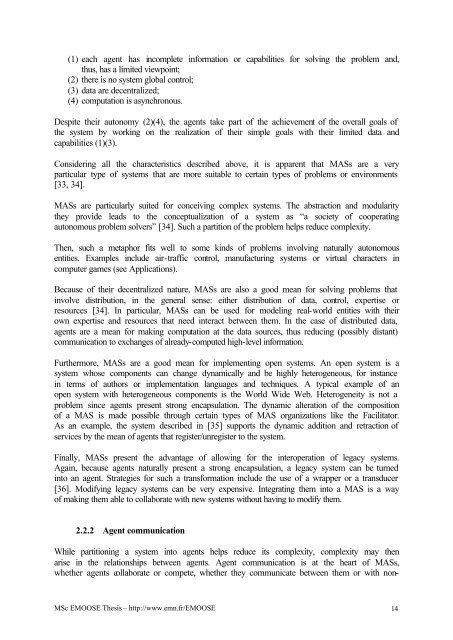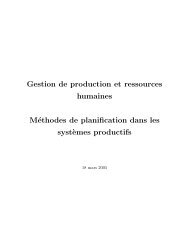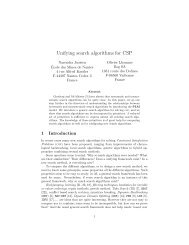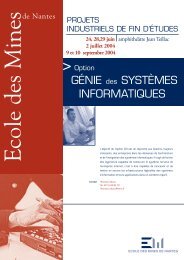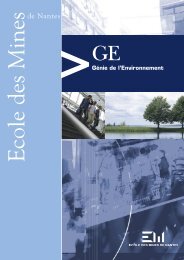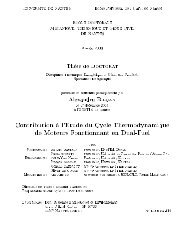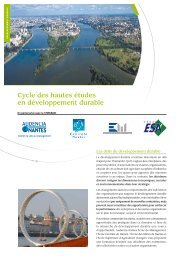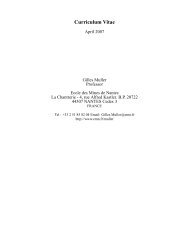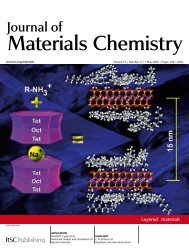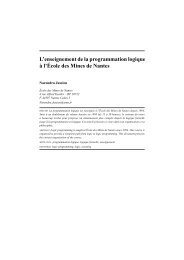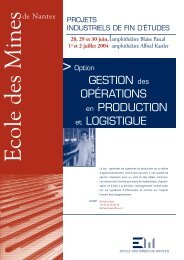pdf - 395 K - Ecole des mines de Nantes
pdf - 395 K - Ecole des mines de Nantes
pdf - 395 K - Ecole des mines de Nantes
Create successful ePaper yourself
Turn your PDF publications into a flip-book with our unique Google optimized e-Paper software.
(1) each agent has incomplete information or capabilities for solving the problem and,thus, has a limited viewpoint;(2) there is no system global control;(3) data are <strong>de</strong>centralized;(4) computation is asynchronous.Despite their autonomy (2)(4), the agents take part of the achievement of the overall goals ofthe system by working on the realization of their simple goals with their limited data andcapabilities (1)(3).Consi<strong>de</strong>ring all the characteristics <strong><strong>de</strong>s</strong>cribed above, it is apparent that MASs are a veryparticular type of systems that are more suitable to certain types of problems or environments[33, 34].MASs are particularly suited for conceiving complex systems. The abstraction and modularitythey provi<strong>de</strong> leads to the conceptualization of a system as “a society of cooperatingautonomous problem solvers” [34]. Such a partition of the problem helps reduce complexity.Then, such a metaphor fits well to some kinds of problems involving naturally autonomousentities. Examples inclu<strong>de</strong> air-traffic control, manufacturing systems or virtual characters incomputer games (see Applications).Because of their <strong>de</strong>centralized nature, MASs are also a good mean for solving problems thatinvolve distribution, in the general sense: either distribution of data, control, expertise orresources [34]. In particular, MASs can be used for mo<strong>de</strong>ling real-world entities with theirown expertise and resources that need interact between them. In the case of distributed data,agents are a mean for making computation at the data sources, thus reducing (possibly distant)communication to exchanges of already-computed high-level information.Furthermore, MASs are a good mean for implementing open systems. An open system is asystem whose components can change dynamically and be highly heterogeneous, for instancein terms of authors or implementation languages and techniques. A typical example of anopen system with heterogeneous components is the World Wi<strong>de</strong> Web. Heterogeneity is not aproblem since agents present strong encapsulation. The dynamic alteration of the compositionof a MAS is ma<strong>de</strong> possible through certain types of MAS organizations like the Facilitator.As an example, the system <strong><strong>de</strong>s</strong>cribed in [35] supports the dynamic addition and retraction ofservices by the mean of agents that register/unregister to the system.Finally, MASs present the advantage of allowing for the interoperation of legacy systems.Again, because agents naturally present a strong encapsulation, a legacy system can be turnedinto an agent. Strategies for such a transformation inclu<strong>de</strong> the use of a wrapper or a transducer[36]. Modifying legacy systems can be very expensive. Integrating them into a MAS is a wayof making them able to collaborate with new systems without having to modify them.2.2.2 Agent communicationWhile partitioning a system into agents helps reduce its complexity, complexity may thenarise in the relationships between agents. Agent communication is at the heart of MASs,whether agents collaborate or compete, whether they communicate between them or with non-MSc EMOOSE Thesis – http://www.emn.fr/EMOOSE 14


